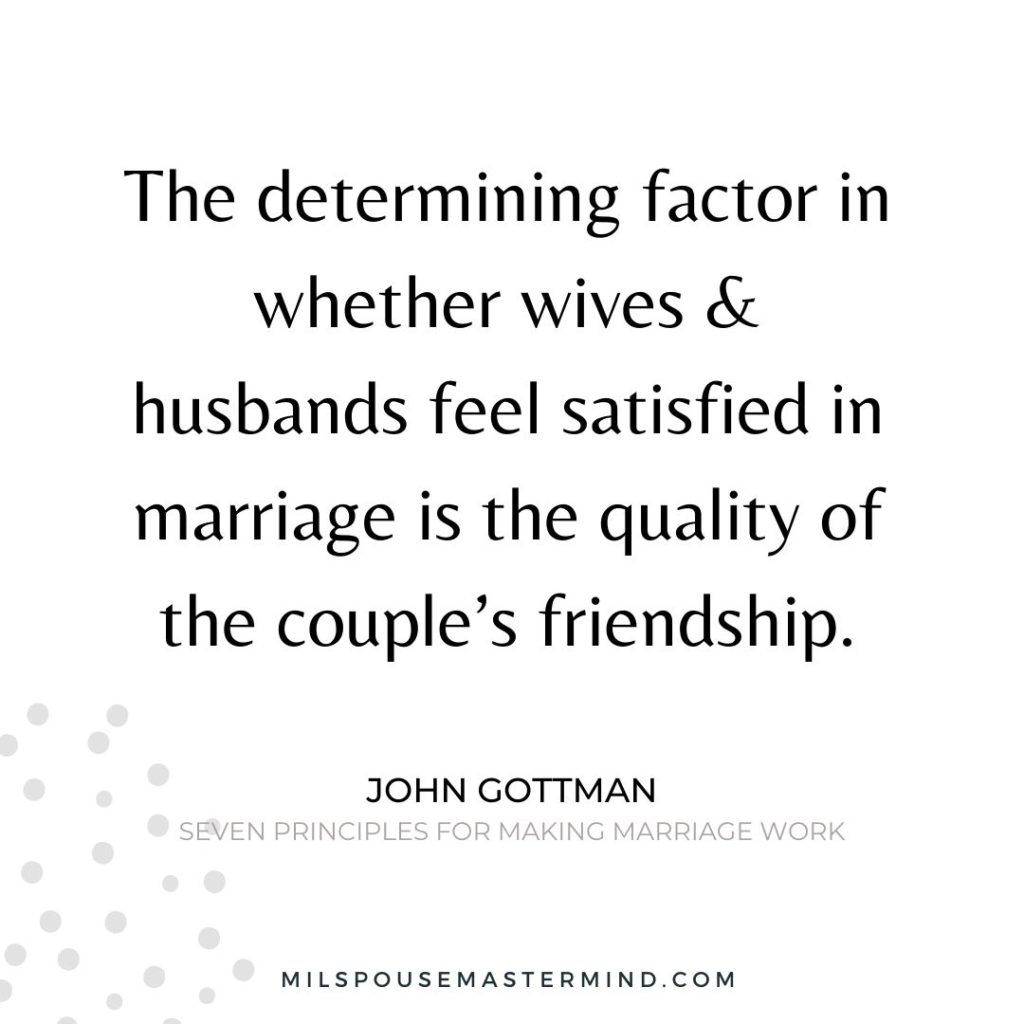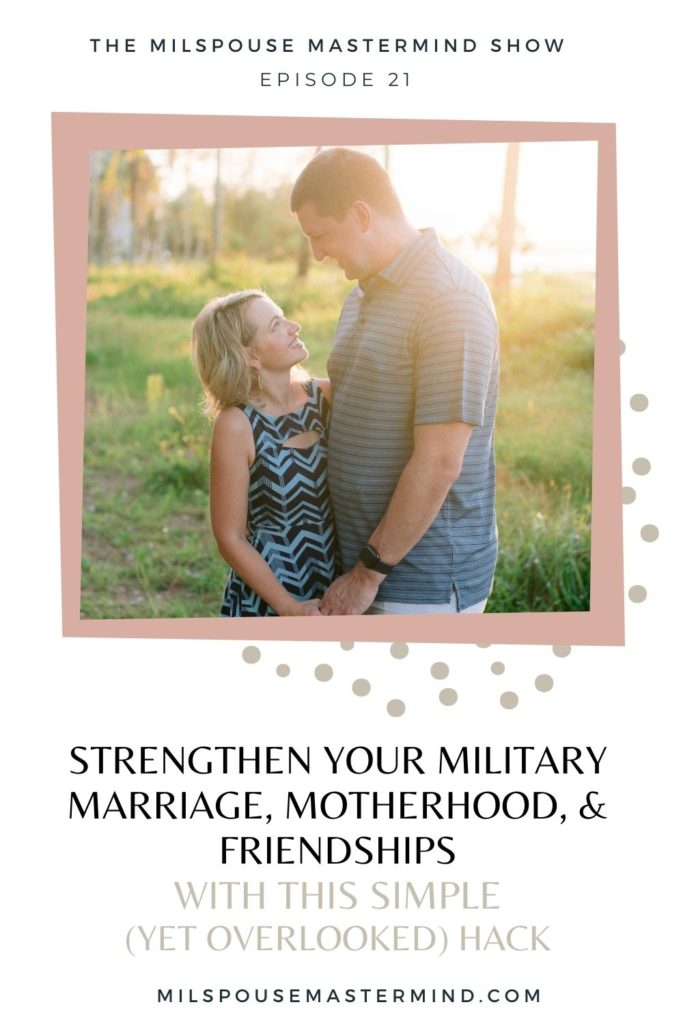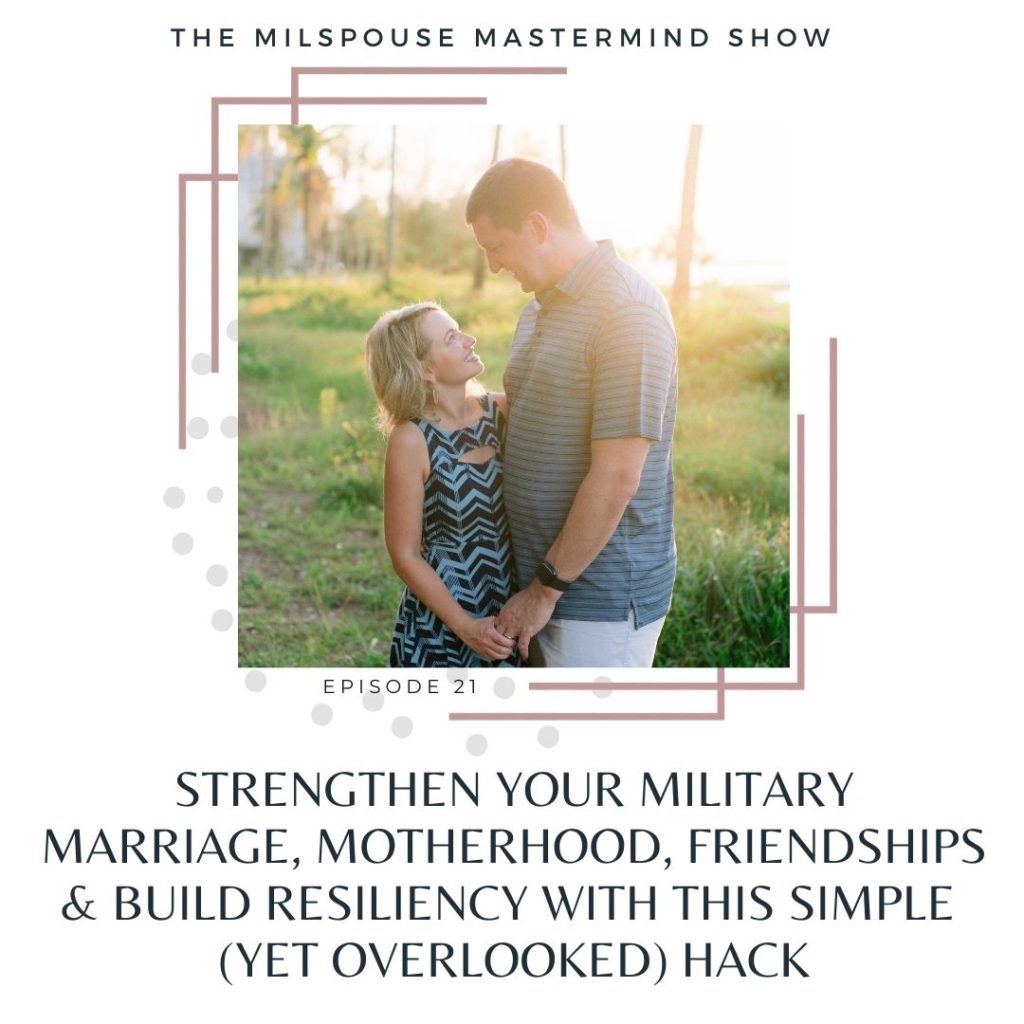A super simple tip to strengthen your military marriage
What if I told you there was one thing you could do today (and every day) to strengthen your military marriage, your relationship with your kids, your friendships and your resiliency? And what if I told you that one thing was super simple to do. So simple, that we often overlook it.
A simple hack that is incredibly valuable to actually help us create the life we want and become the people we want to be.
Today we’re diving into what this skill is and how you can be more intentional about implementing it each and every day!
Links & More
Military Spouse Resiliency Toolkit -> http://spousert.wpengine.com
Seven Principles for Making Marriage Work by John Gottman ->
Join the Free MilSpouse Mastermind FB Community ->
https://milspousemastermind.com/community
Free Download: Reclaiming Your Life Starts Here (Learn how to stop feeling pulled in all direction & prioritize what matters most) -> https://milspousemastermind.com/values
Free Download: Growth Wheel Assessment (Assess which areas of your life are out of balance) https://milspousemastermind.com/growthwheel
Request a Get Unstuck Coaching Session -> christine@milspousemastermind.com
Full episodes, blog posts and more -> https://milspousemastermind.com
Connect -> hello@milspousemastermind.com
Instagram -> @christineh
Listen on Apple Podcast -> https://podcasts.apple.com/us/podcast/milspouse-mastermind-show-personal-development-work/id1555191004
Listen on Google ->
https://www.google.com/podcasts?feed=aHR0cHM6Ly9mZWVkLnBvZGJlYW4uY29tL01pbFNwb3VzZU1hc3Rlcm1pbmQvZmVlZC54bWw%3D

EPISODE Transcript
Hey friends. Welcome back to another episode of the milspouse mastermind show. Today, we’re talking about how to strengthen your marriage, your motherhood, your friendships, and build resiliency with this simple yet overlooked hack. This is a skill that I think is so simple that we don’t even think to do it, and we can actually be hurting our relationships because we’re just not aware of it.
[00:00:27] So let’s dive in and talk about what the skill is and how you can put it into practice today.
[00:01:26] Recently I had the opportunity to attend a course and become certified as an Air Force Resilience Training Assistant. Now you’re probably wondering what in the world is that? Well, the Air Force has developed a whole resilience training program where they identified specific skills that build resiliency in airmen. They looked at what resiliency is and how we build it.
[00:01:56] And they came up with three primary categories, your values and your strengths, your resilient thinking, and your focus and attention. And within those three categories, there are eight specific skills that will help you become a more resilient person. Now, before we dig into this too deeply., What resiliency is, if you are a military spouse, you’ve probably, by this point, heard the term resiliency. But it doesn’t always get defined.
[00:02:28] So for the purpose of our conversation today, we’re going to define resiliency as a set of skills that will help you do three things. It’s going to help you recover and adapt after stress or a challenge. It’s going to help you perform in the face of challenges. And it’s going to give you a sense of well-being and purpose.
[00:02:53] When I first heard about this curriculum and the program, I was interested because it covers a lot of the same material that we talk about on this show. My purpose is to help you as a military spouse learn to thrive. To have that sense of purpose. And so many of the skills that they are teaching airmen will help you do just that.
[00:03:16] So I made the decision to go ahead and get certified in the Air Force curriculum so I know what they’re teaching and it will give me more opportunities to invest in military school. As part of our certification process, we were each assigned one of the eight skills and we had to give a presentation on that skill.
[00:03:35] And so since I recently did that, I thought this would be the perfect time just to share that skill with you, because this is a skill we don’t really think about most of the time. It’s so simple. So easy to overlook, but if we will just make this simple switch and make this skill a part of our life, it’s going to transform our relationships, our friendships, our marriage, and help us become more resilient people.
[00:04:05] So let’s talk about what the skill is and how to implement it in your everyday. But before we dive in, I just want to remind you, if you have not done so, head over to iTunes and leave this show a review. We love it when you share this message with other military spouses. And one of the most simple ways to share this message is by sharing this show. Leave us a review on iTunes. That helps us get found in the feed.
[00:04:33] You can also go and share that podcasts and your local military spouse Facebook group, or anywhere that you are in connection with other military spouses. We want to help all of us as military spouses thrive, get unstuck, live lives of purpose and understand that we don’t have to wait for it tomorrow to chase our dreams.
[00:04:59] Okay. So now you’re wondering, what is this simple skill and am I doing it in my own life? Well, first let me tell you what this does for you. It helps you build, strengthen, and maintain important relationships. Because relationships are critical for resilience. So many times when we think about resilience, we think about just ourselves. About how we do things on our own.
[00:05:24] But the truth is we need each other. As I say all the time, we are better together. So this skill is celebrating good news. What do I mean by celebrating good news and how does this impact our relationships and our resilience? Let’s talk about for a moment.
[00:05:51] What happens when something goes wrong? When you’re having a difficult day or going through a deployment or whatever that current struggle is. Do we want to go through that thing alone? No, we want to have a support system. We want to have friends and family we can turn to in the tough times. But this skill of celebrating good news is actually a skill that is built, not in the difficult times, but in the good.
[00:06:24] Celebrating good news is just being there to support and celebrate news when somebody has something good happened to them. And this lays the foundation for someone being willing to come and share news with us when it’s not-so-good news. You see celebrating good news provides a boost of positive emotion for both you and the person you are supporting.
[00:06:49] And these positive conversations lay the groundwork for times when someone needs your support. So let’s talk about how we celebrate good news. Let’s say you and your friend are both stationed overseas and your friend comes to you with good news. They said, Hey, I got a plane ticket home. I’m going to be able to go home for a month and visit my family.
[00:07:14] Well, in that moment, you have a few different options about how you can respond to your friend.. You could point out the problems and provide negative feedback to them. You could say, wow, that’s really expensive. Are you going to be able to get that time off of work?
[00:07:37] This is a technique called squashing. You’re squashing the joy that they experienced in that moment in telling you about the good news. You could also say something like, Hmm, that’s not a big deal. You’re shutting them down. This is responding with low energy and showing that you really don’t care about what they have to say. Or you could say, well, I really wanted to go home, but I just couldn’t handle the plane ride with three small children by myself.
[00:08:10] This is the technique known as stealing. You’re stealing the focus of the conversation off of them, and putting it on yourself. These are all responses that we can give without really thinking about what we’re saying. Now, a better strategy would be to help them celebrate the moment.
[00:08:34] I So you say, that’s awesome. I’m so excited that you have this opportunity to go home and see your family. And I’m really glad you were able to get the time off to do.
And when you respond in that way, you give both yourself and your friend a boost of positive emotion. That’s building that foundation, that relationship. Now there’s a couple of different ways that we can celebrate with them.
[00:08:59] We can celebrate by asking questions, asking for additional details about that news, asking why that event was meaningful to them. You can express excitement and enthusiasm. You can just be engaged and interested. Be authentic, show support. That’s all this is, is showing support for what they’re telling you.
[00:09:26] Now there’s a couple of key points to keep in mind about this particular skill. One. You celebrate the news with them, not because you care about their news, but because you care about them as a person. They may tell you some news that you really don’t care about. But the fact is, it’s not about the news itself. It’s about the person, because you care about that person
[00:09:50]. You care what they’re saying, even if you’re not necessarily interested in the event itself. And celebrating with someone, doesn’t have to be time consuming. It doesn’t mean that you need to sit there for 30 minutes and listen to the details of their particular unique hobby or skill.
[00:10:14] It just means you need to ask a few questions and show interest because that’s what they are interested in. Now don’t celebrate something dangerous. If it’s obviously dangerous or illegal, then you don’t want to celebrate that. But if it’s just something that you are concerned about, think conversation A and conversation B.
[00:10:36] Conversation a is you expressing enthusiasm and support to whatever they just told you. Conversation B is then going back and expressing your concerns about the news they shared.
So for example, if my husband comes to me and says, Hey, I’m going back to school, I’m going to be studying a lot in the evenings. My conversation A with him is saying, Hey, that’s exciting. I’m so happy for you and for this opportunity. I want to support you in that.
Conversation B is going and saying, Hey, we have young kids with bedtimes and how is this going to affect that or their bedtime routine? How are we going to make this work for our family? But that conversation comes after me showing encouragement and support, celebrating the good news first.
[00:11:23] Celebrating good news with someone can be a gateway conversation in your relationship because if a person trusts you enough to share good news with you, then they’re more likely to trust you when they have bad news or difficult news to share with someone. And it allows you to be a support for that friend.
[00:11:52] All relationships are built over time, and essentially, celebrating good news is like putting money in an emotional bank account. If you are continually putting good news, celebrating with the other person. Then when you have difficulties in your relationship, you have that history of good news, that positive, emotional connection to fall back on.
[00:12:27] I recently read Seven Principles for Making Marriage Work by John Gottman. And he basically said this exact same thing. So often in marriage, we think that the key to a healthy marriage is communication skills. So if we can just work on our communication, then we’ll have a good relationship. But as he points out, according to the research, the determining factor in whether wives and husbands feel satisfied in their friendship. Is by 70%, the quality of the couples friendships. It’s
[00:12:57] It’s this concept that they call connection attunement. It’s understanding each other on a core emotional level. The more skilled at understanding each other emotionally, the stronger the friendship. Basically, it’s not how you handle disagreements, because those will inevitably come in.
[00:13:26] Every relationship, the key to building a healthy marriage relationship, is how you engage with each other when you’re not fighting. Celebrating good news with the other person is building a strong, emotional bank account for the difficult times. In your marriage, in your friendships, in your relationships with your kids, you are building currency for future conversations that might not be about good news. If you can respond well to good news, then someone is more likely to trust you, to share that news with you.
[00:13:56] And the last thing that I would say about this skill of celebrating good news is that when someone chooses to share good news with you, remember that they chose you because they have trust in your relationship.
[00:14:23] You can honor their trust by showing interest in what they had to say. Now if you’re like me and someone comes to you and says, Hey, I’m going on vacation, or I got a new job, or they share some type of good news with me, then I’m genuinely excited for that person.
[00:14:51] But when I think back to all of my interactions and communication over the last week, the last few weeks…the people that I have the most difficulty in expressing good news and celebrating good news with are those that are closest to me. We often use strategies that deflate good news with those we care the most about. So think back to your last few weeks and your interactions with those closest to you. How did you respond when they shared news with you?
[00:15:19] Are there any patterns in how you respond to someone sharing news with you? Is there anything that you need to work on for the future in how you respond when someone shares good news with you? I think most of us could look back on our interactions and find times when we genuinely show excitement and interest when someone shared good news with us.
[00:15:45] And we could probably also think back to times when we deflated someone’s good news, either by squashing, by stealing the spotlight, or by shutting someone down and not showing interest. I know I can do this. My children, when they’re trying to tell me something that they’re really excited about, and I’m in the middle of cooking dinner and trying to clean the house and I have a lot going on, then I can shut them down pretty easily and not give them just the attention.
[00:16:17] Ask a few questions and show genuine interest in what they’re trying to tell me. I can do that. With my spouse, when he comes home and tells me something that went on that day with a ton of military acronyms that I don’t actually know what that means. And I’m like, okay. And I kind of shut him down.
[00:16:36] Or I can do it with a friend who’s telling me about a hobby that I really have no interest about. I’m focused on something else. So I think one of the keys is just being intentional about how we respond to other people. And when we celebrate good news with them, by being authentic, by asking questions, and by showing our support, we build strengthen, maintain our relationships and ultimately build resilience.
[00:17:04] It’s a super simple thing to do. Show interest. Share good news. But it will go such a long way to helping us have healthy relationships and thrive as military spouses, as moms or dads, in connection with others and in living a life of purpose. So I just wanted to share that simple little hack with you today.
[00:17:30] I hope it encouraged and blessed you and gave you a practical way to strengthen the relationships in your life. The last thing I will share with you is that if you are interested in the full resilience training curriculum, there is a website specifically for military spouses. You can go to spouse WP engine.com.
[00:17:55] I’ll link that below in the show notes or on our website. So you can head over to it. It’ll have an introduction to resiliency, along with lessons and examples and activities for each of the eight components of the resiliency program. So head over and check that out again. If you found this valuable, send me a DM on Instagram, share this in your stories, or head over to iTunes and leave us a review. Until next time, may you live filled, fueled and full of joy.



